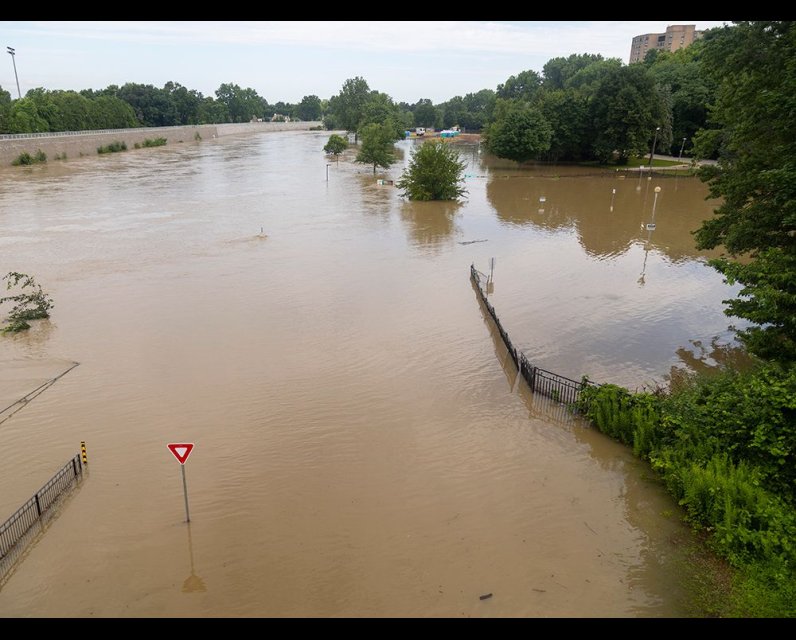Canadians drastically downgrade climate as a priority, poll finds, as economic concerns escalate

OTTAWA — One of the key barriers that seemed to be facing the Carney government’s plans to fast-track big projects designed to boost the Canadian economy — namely, climate concerns — appears now to be not much of an obstacle at all when it comes to public opinion.
A new Leger poll released Friday asked Canadians about what they thought were the biggest challenges facing Canada. Trade and tariff issues and U.S. relations were No. 1, at 20 per cent. But climate change, one of the federal government’s key objections in recent years to building or expanding pipelines, ports and other big projects, was way down the list, a “third tier” issue, said Leger executive vice-president Andrew Enns.
Prime Minister Mark Carney could find the shift makes his life easier as he faces calls to roll back the imposing climate policies of the previous prime minister , including a planned emissions cap on oil and gas production, electric vehicle mandates, an oil tanker ban off the B.C. coast, plans to force fossil fuels off the electricity grid, and hostility to oil development and pipelines.
Just four per cent of respondents listed “climate change/extreme weather” as the No. 1 issue facing Canada today, putting it in eighth place among the 14 top issues offered as choices.
That’s in sharp contrast to a similar Leger poll conducted in 2019, Enns said. Back then his data show that “fighting climate change” ranked as the third most frequently cited priority (by 30 per cent), just a few points behind taxation and “jobs and the economy” (both 35 per cent). In that poll — conducted prior to prior to the pandemic, six years of mostly sluggish economic growth, rising prices and a trade war with the United States — respondents were asked to choose the two issues most important to them.
Enns said environmental issues have tumbled over the ensuing six years into the “third tier” of public concerns, as Canadians are seized with economic issues, including tariffs, housing prices, immigration and inflation — all of which were ranked by poll respondents as more pressing than climate concerns.
“These things hit people directly,” said Enns. “We all prioritize.”
While 20 per cent of poll respondents identified “tariffs/(President Donald)Trump/U.S. aggression” as the top issue; inflation and rising prices were given top spot by 18 per cent; housing affordability by 11 per cent; “state of the economy” by 10 per cent; health care by nine per cent; and immigration by six per cent. “Government debt/deficit” and “high taxes” tied with “climate change/extreme weather,” as chosen by four per cent. The poll was taken well after weeks of news of huge wildfires this summer in Manitoba and Saskatchewan, and Central Canadian heat waves in June.
Brian Lee Crowley, managing director of the Macdonald-Laurier Institute, said that more Canadians are becoming aware of the costs of years of climate change policy, particularly when it comes to developing the country’s energy and other natural resources industries. The previous prime minister, Justin Trudeau, had made climate change a top priority, often downgrading other considerations at its expense, particularly economic development and resource exploitation, making sacrifices other countries were not.
“They’re saying it’s not a trade-off I want to make,” Crowley said.
By contrast, one of the Carney government’s first pieces of legislation is the One Canadian Economy Act, It allows the federal cabinet to fast-track major infrastructure projects, including resource development, by identifying them as being in the “national interest” and bypassing the normal environmental regulations and approvals. (The specific laws to that effect are in the Building Canada Act, contained within the larger One Canadian Economy Act.)
The legislation, which has been criticized for giving the federal government too much power and discretion, became law late last month.
Upon taking office in March, Carney moved quickly to scrap the consumer portion of Canada’s carbon tax. He has indicated he would be open to approving a new oil export pipeline. And he met earlier this month with the chief executives of Canada’s major auto producers, who pressed him to cancel or delay the federal mandate that electric vehicles must comprise at least 20 per cent of new auto sales by 2026 and 100 per cent by 2035.
In March, when Carney was first sworn in after winning the federal Liberal leadership, Alberta Premier Danielle Smith presented a list of nine demands that would be necessary to reset relations with the West that had been battered during the Trudeau years. All of them were related to cancelling Liberal environmental policies. Last week, the environment ministers of Alberta and Ontario issued a joint letter asking Carney to abandon “net zero” policies they say are holding back Canada economically.
“We are hopeful that (the Carney government) will move away from policies and legislation that undermine competitiveness, delay project development, and disproportionately harm certain (regions) without any quantifiable benefit to the natural environment,” they wrote.
Crowley said Canadians are now more aware that Canadian wealth and jobs are tied directly to its natural resources and its ability to get them to market as efficiently as possible.
“I think that message is starting to get through to a lot of people.”
Crowley added that the Carney government is still in its honeymoon phase but that these helpful poll indicators show the prime minister — who recently won an election victory from the jaws of certain Liberal defeat, thanks to a fortunate turn of external events — once again has timing on his side.
“I think he’s led a bit of a charmed life politically,” Crowley said.
The poll sampled 1,546 adult Canadians between July 4-6. A probability sample of this size yields a margin of error no greater than plus or minus 2.49 per cent 19 times out of 20.
stuck@postmedia.com
National Post
Our website is the place for the latest breaking news, exclusive scoops, longreads and provocative commentary. Please bookmark nationalpost.com and sign up for our politics newsletter, First Reading, here.


Comments
Be the first to comment